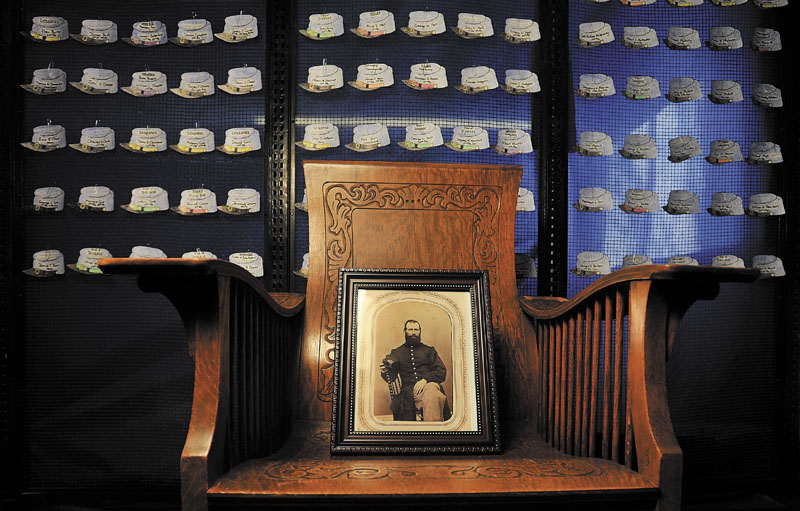CLINTON — “The raids of our cavalry have proved that the rebels have every available man in their ranks, or nearly every man. Now let the North send out his reserves; there are enough to spare. Let them come.”
Clinton resident Capt. Charles W. Billings wrote to his father and family May 19, 1863, while camped near Falmouth, Va., during the Civil War. He continued:
“Who would not jump to serve his country now that everything is promising? It must and will be done. The cause of God and humanity demand it.
“We must either conquer or be conquered; no other alternative is presented.”
Billings, a 37-year-old Union captain with the 20th Maine Volunteer Infantry Regiment, was mortally wounded less than two months later.
It was July 2, 1863, when his Company C fought at Little Round Top, the second day of the famous Battle of Gettysburg. He died July 15 in a barn converted into a field hospital.
Billings is the highest-ranking of 250 Clinton soldiers who are being memorialized at the Brown Memorial Library’s 150th anniversary of the Civil War. The library will host an open house with historical photos and displays Tuesday, from 4 to 8 p.m., to observe the start of the war on April 12, 1861, with the attack of Fort Sumter, near Charleston, S.C.
The open house event will also feature Civil War music and food, historic maps and letters, a Civil War re-enactor, as well as prizes such as Civil War books, CDs and movies.
For Cherri Dickey-Whitish, director of the library and organizer of the Tuesday event, the national milestone is also an opportunity for Clinton residents to learn more about the town’s local connection to the war. Billings is buried at the town’s Riverview Cemetery.
“The 20th Maine is very well known and Billings was in the middle of what happened,” she said. “It’s a prominent feature of this.”
Because of the novel “The Killer Angels” and movie “Gettysburg,” the 20th Maine’s regiment commander at Gettysburg, Col. Joshua Lawrence Chamberlain, has become among the Civil War’s most famous soldiers.
Billings, one of eight captains in the regiment, is worthy of just as much recognition given his local ties, Dickey-Whitish said. A vintage photo of Billings is part of the library display.
The library also has set up a display that visually depicts the sacrifice Clinton residents made. Dickey-Whitish and others have hung paper Union hats for each of the 250 soldiers who enlisted in Clinton. The hats contain the soldier’s name and regiment, and they’re color-coded to indicate what happened to them — whether killed in combat or by disease, wounded, captured, deserted, or made it home alive.
“I wanted people to look at that and say, ‘Wow,'” she said. “This is meant to honor all of them.”
It’s also personal for Dickey-Whitish, whose research shows that her own great-great-grandfather, Oliver Dickey, of Clinton, died of typhoid fever while serving in the war.
Information about the 250 soldiers came from the book “The History of Clinton, Maine,” published in 1970 by Maj. Gen. Carlton Fisher, Dickey-Whitish said.
That 250 soldiers came from a town with a population of about 1900 is an amazing eye-opener into the war’s devastating reach, said Bruce Keezer, president of the Friends of the Brown Memorial Library.
“It’s incredible to see the amount of men. You don’t see something like that now, where most of the male population of an entire town went off to war,” Keezer said. “That really puts it on scale.”
Among the stories about Clinton’s enlisted soldiers, there are some unusual ones, Dickey-Whitish said. One soldier, Ezra R. Reed, switched sides twice during the war, according to Fisher’s history book.
Reed was serving in the First Maine Heavy Artillery when he was captured by Confederates June 22, 1863, in Petersburg, Va. Considered a prisoner, Reed enlisted with the 10th Tennessee Regiment, becoming a Confederate soldier, but he was re-captured by the Union army on Dec. 28, 1864. He re-enlisted with the Union for three years, was promoted to a sergeant, and died in Waterville in 1904.
Cindy Lowell, the library’s assistant director, said she became more and more fascinated with the town’s Civil War history as the display came together. Library staff and volunteers worked on the display and research for the last month or so.
“We don’t have a big budget, so we decided to be creative,” Lowell said.
Dickey-Whitish hopes Clinton residents will learn something, too.
“Basically, it’s to try and enlighten people as to what happened back then and spreading enthusiasm about the anniversary,” Dickey-Whitish said.
Scott Monroe — 861-9239
smonroe@centralmaine.com
Copy the Story LinkSend questions/comments to the editors.



Success. Please wait for the page to reload. If the page does not reload within 5 seconds, please refresh the page.
Enter your email and password to access comments.
Hi, to comment on stories you must . This profile is in addition to your subscription and website login.
Already have a commenting profile? .
Invalid username/password.
Please check your email to confirm and complete your registration.
Only subscribers are eligible to post comments. Please subscribe or login first for digital access. Here’s why.
Use the form below to reset your password. When you've submitted your account email, we will send an email with a reset code.